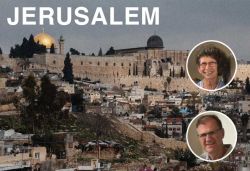The challenge of unity during the time of Coronavirus
First on what the pandemic has meant in terms of changes for a hotelier. Domestic tourism grew, which led him to “kosherize” the restaurant to accommodate observant Jews, as tourists could no longer enter Israel. It is a caterer specializing in organic products that now provides catering.
Yad Hashmona - “the memory of the 8” was built by Finns, in memory of 8 Finnish Jews delivered to the Nazis during the 2nd World War. Besides, Tsuriel's wife is Finnish and gave him a 7th child during the Coronavirus period!
Tsuriel is also the pastor of a messianic community that meets here; he shared with us the challenge of keeping the unity of the community during the Coronavirus, as the reactions to government measures were diverse. But he and his council believe they have succeeded.
Through him we became aware of how diverse the messianic movement is in Israel. Between a small “Gnostic” community which denies the humanity of Jesus and the messianics who deny his divinity… it is the “big gap”.
With Tsuriel Bar David
According to Tsuriel, seeing in Jesus only a Jew inhabited by the Spirit suits Judaism well and would be the great temptation of the messianics. But, of course, the great majority confesses the divino-humanity of Jesus. With, however, an evangelical flavor! However, several communities have introduced more Jewish elements. To discover the diversity of the growing messsianic Judaism - there are three times as many messianics today as 20 years ago - one can read with profit the book recently published by the Caspari Center in Jerusalem: “Jesus-Believing Israelis : Exploring Messianic Fellowships”.
“Based on the data collected, the number of Israeli Messianic believers in 2020 stood at 15,323 people. Less than half of congregations use Hebrew as their primary language. Russian-speaking communities are the largest group, with 136 congregations. Hebrew-speaking communities come second, with 83 congregations. The other languages are Amharic (30 communities), English (16), Spanish (6) and Romanian (2). The main leader of the congregation is an Israeli by birth in only 17% of cases. The Israeli messianic movement can legitimately be called an immigrant movement,” explain the two authors of this book. https://www.caspari.com/2022/02/07/the-caspari-center-survey-released-the-israeli-messianic-movement-has-more-than-tripled-in-the-last-20- years
And then a great debate has taken place recently (and continues!) on the question of a ministry of unity between the various communities which are Congregationalists.
Tsuriel is happy that Yad Hashmona is on the road to Emmaus – he sees it as a nod of Providence – and will gladly welcome the group of pilgrims at Easter 2023, as it did two years ago. On the menu is a visit to the “Biblical Garden” and a “Biblical Meal”.
Another relationship with the land
In the afternoon we crossed the village and we went to the center of “Revive Israel” where Youval Yanaï, its director, joined us. Immediately he shared with us the turning point caused by the time of the Coronavirus.
“In November 2019, I received during worship a call to open the windows. But it was winter. When the Covid came, I understood…”. God was preparing them for a change. With Valérie, his Genevan wife and another family, they then began a community of life which then expanded. They started working the land and farming. Youval trained in agriculture and incorporated it into the 40-day training that Revive Israel offers to young messianic Israelis. “Spiritual renewal requires a different relationship with the land: working it allows us to internalize biblical teaching. The goats evangelize us! Revive Israel is what it is today: living the Gospel every day.”
On the wall, Youval hung up a photo of his great-grandfather, who came to Palestine from Kazakhstan at the end of the 19th century. Spade in hand, he worked the earth, in the background we recognize Mount Tabor. Israelis love to connect with creation and are drawn to permaculture. This project is called “La ferme du 3e jour”. What happened on day 3? Reread the biblical stories, from that of creation to that of the resurrection, including those of Sinai and Jonah!
“God prepared us. Some would like to continue as before. But for us, everything has changed...and it's better than before,” he said. Youval again accepted to be our guide on the road to Emmaus between Yad Hashmona and Emmaus-Nicopolis, next year. He promised to invite some young people there to walk with our group.
After this beautiful encounter we decided to go exploring on the path that joins the road to Emmaus, from Yad Hashmona, following Tsuriel's advice, but after less than a kilometer we had to turn back, discouraged by brambles and rocks blocking it. We made a U-turn and headed towards Neve Illan where we found a more suitable path for the route we will take next year from the Saxum center, in Kyriat Yearim.
The following day, April 23, we took part in the worship – entirely in Hebrew – of the messianic community of Yad Hashmona. It bagan with five songs in Hebrew, including three psalms: how good it is to sing the Word of God in the language in which it was written!
After these songs, about twenty children were blessed and joined their “Sunday School”. But the older ones, another twenty were in front of us, including some children of our friend Tsuriel. Two of them are also musicians of the musical group.
An elder of the community then gave an “expository preaching” (a sermon that exposes the biblical text by updating it...given in English and Hebrew) on the relationships to be lived in the couple, in the family with the children and between employees and bosses, in the light of the text of Ephesians 6. I retain this sentence: “God gives us his wisdom and his Spirit so that we live healthily in our relationships with each other”.
More to come soon...Friendship to all!
Martin Hoegger


